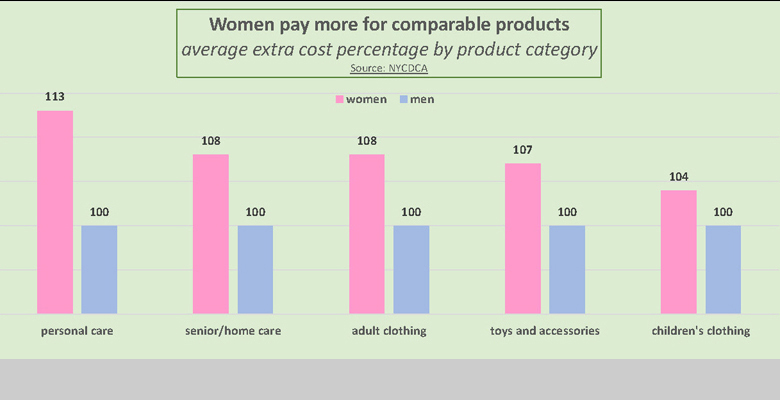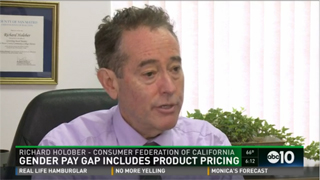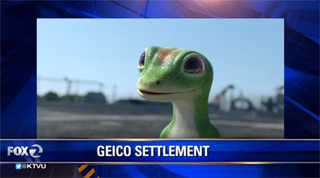Category Archives: CFC in the News
Lawmakers Sweat Details Of Consumer Health Privacy
by Cheryl Miller, The Recorder (San Francisco)

“We are in total agreement with the intent of the bill and believe that it’s very, very important that this information be given strong privacy protections,” Richard Holober, executive director of the Consumer Federation of California, told the Assembly Privacy and Consumer Protection Committee. But “we’ve had a lot of experience over the years with various privacy laws and how courts interpret those laws and … we want to be very precise about how a bill is written to make sure that it’s being interpreted by the industry and the courts as it was intended,” Holober said. Read More ›
Bill Aims To End ‘Pink Tax’ On Products
by Alia Ismay, San Diego Union-Tribune

Hueso’s Senate Bill 899 is sponsored by the Consumer Federation of California. It states that “no business establishment of any kind whatsoever may discriminate, with respect to the price charged for goods of a substantially similar or like kind, against a person because of the person’s gender.” Products are defined as “substantially similar” when they are the same brand, have the same functional components and share 90 percent of the same materials or ingredients. … The bill does not prohibit price differences based on labor, material or other “gender-neutral” factors. Read More ›
State Senate Looks At Banning Gender-Based Bias In Retail Pricing
by Bob Egelko and Melody Gutierrez, San Francisco Chronicle

Lisa Cuesta, a constituent of [SB 899 author Ben] Hueso’s in Chula Vista and chief operations officer of Casa Familiar, a social services nonprofit … [is] the mother of a 7-year-old girl and a 4-year-old boy and says she’s unhappily gotten accustomed to paying $1 to $3 more for toy building blocks or plastic cars and trucks that are pink, purple or yellow — pastels marketed as girls’ colors, she said. “I don’t have the luxury or the time to go into the boys’ section and into the girls’ section” to look for the best deal, Cuesta said in an interview. Read More ›
Women’s Products That Cost More Than Men’s? It’s Called The ‘Pink Tax’, And Not Everyone’s Mad
by Teri Sforza, Orange County Register

Richard Holober, executive director of the Consumer Federation, said with exasperation that a Levi’s One Pocket Boyfriend Shirt has been marketed to women for $78. Their boyfriends, he said, could buy a nearly identical shirt for $48. “Add the word ‘boyfriend’ and put the shirt on a woman, and the price goes up by $30,” Holober said. “Businesses have figured out, through a lot of research, how to extract extra dollars by giving products a veneer of being designed especially for girls or women. But that’s not right.” Read More ›
Gender-Based Price Differences Could Be Banned
by Allen Young, Sacramento Business Journal

Senate Bill 899 passed the Senate Judiciary Committee along party lines this week and now heads to the Senate floor. … Female consumers pay 7 percent more on average for products that are essentially the same as the male version, according to a study released in December by a public consumer watchdog agency in New York City. The study looked at 800 consumer products with “clear male and female versions” and found that products targeted toward girls and women were more expensive 42 percent of the time. Read More ›
Gender Pay Gap Includes Product Pricing
by Gabrielle Karol, ABC10, Sacramento

The Consumer Federation of California sponsored [SB 899], which was authored by State Senator Ben Hueso (D-San Diego). The bill’s motivation is a December report from New York’s Department of Consumer Affairs. In the report, nearly 800 products are compared at two dozen different retailers. Forty-two percent of the time, women’s products are priced higher than men’s products. The so-called “pink tax” means shoppers are paying an average seven percent more for items targeted to women. Read More ›
Wells Fargo To Pay $8.5 Million In Privacy Case, None To Victims
by Kathleen Pender, San Francisco Chronicle

[Penal Code sections 632 and 632.7] make it illegal to record phone conversations without the consent of all parties. Violators can be fined up to $2,500 per call or imprisoned in a county jail. … “This is very different from the kinds of settlements I have seen brought by private attorneys representing consumers” in class-action cases alleging violations of California’s eavesdropping law, said Richard Holober, executive director of the Consumer Federation of California. “In those kinds of lawsuits, individual class members typically can receive hundreds or thousands of dollars if they submit a claim. This involves zero recovery by individual class members.” Read More ›
The Pink Tax: Why Women’s Products Often Cost More
by Susan Johnston Taylor, U.S. News & World Report

According to a study of gendered pricing released by New York City Department of Consumer Affairs last year, shampoo and conditioner marketed to women cost an average of 48 percent more than those marketed to men, while women’s jeans cost 10 percent more than men’s, and girls’ bikes and scooters cost 6 percent more than boys’. Overall, the study found that products marketed to women cost more 42 percent of the time. … Some items marketed to women not only cost more but actually contain less of the product because manufacturers make the product smaller and more feminine-looking. Read More ›
Consumer Federation Of California Releases 2015 Scorecard For State Lawmakers
The Consumer Federation of California (CFC) has released its 2015 Scorecard for State Legislators, which rates lawmakers on the votes they cast on key issues, including privacy, automobile safety, household toxics, truth in advertising, living wages, reform of the California Public Utilities Commission, and other consumer protection … Read More ›
CFC Saved Drivers Over $15 Million On Insurance In 2015
Hartford and Safeco had both sought to boost auto insurance rates by almost 7%, but CFC challenged the rate hike proposals. The result: $5 million in auto policy savings for Hartford customers and $10 million for Safeco customers. In August, GEICO agreed to pay $6 million to settle CFC’s complaint alleging the insurance giant violated civil rights and insurance law by targeting women and unmarried, lower-income motorists with deceptive and inflated automobile insurance rate quotes. It is difficult to calculate motorists’ potential savings resulting from the settlement, but CFC estimates it may reach several million dollars annually. Read More ›
Auto Insurance Company GEICO Pays Out Multi-Million Dollar Settlement
by Tom Vacar, Fox 2 (KTVU Oakland)

The Consumer Federation of California charges that GEICO tried to discourage less preferable customers. Those include those not college-educated, not professional, not executive, a woman, an unmarried person, or those not currently insured. They would not be offered those lowest legal minimum [rates]. Read More ›
Geico Pays $6M To Settle Insurance Discrimination Claim
by Kathleen Pender, San Francisco Chronicle

Geico will pay $6 million to settle a complaint alleging it illegally discriminated against women, unmarried people, blue-collar workers and those without four-year college degrees by showing them costlier auto insurance policies on its Web site than it showed other potential customers. “We believe the primary intent was to drive these folks away from Geico to someone else’s Web site or at least make sure they were paying a lot more money if they didn’t drive them away,” said Richard Holober, executive director of the Consumer Federation of America, the nonprofit advocacy group that filed the complaint. Read More ›
Geico Agrees To $6-Million Settlement In Discriminatory Pricing Case
by Nick Shively, Los Angeles Times

The agreement stems from a petition filed by the Consumer Federation of California asking the department to take action against the Chevy Chase, Md.-based insurer on the grounds that it was discriminating based on occupation, education level and other personal characteristics. The federation had tested Geico’s website and found the insurer misrepresented information for customers who were unmarried, unemployed or employed in a low-wage occupation, had not obtained a four-year college degree and had gaps in insurance coverage, according to the petition documents. Read More ›